Key takeaways:
- Collective storytelling in advocacy amplifies voices and fosters empathy, leading to more impactful initiatives.
- Building strong community networks enhances support, resources, and inclusivity, driving meaningful change.
- Patience and collaboration are vital for achieving significant results in advocacy efforts.
- Sharing personal stories empowers individuals and emphasizes the importance of listening to those affected by policies.
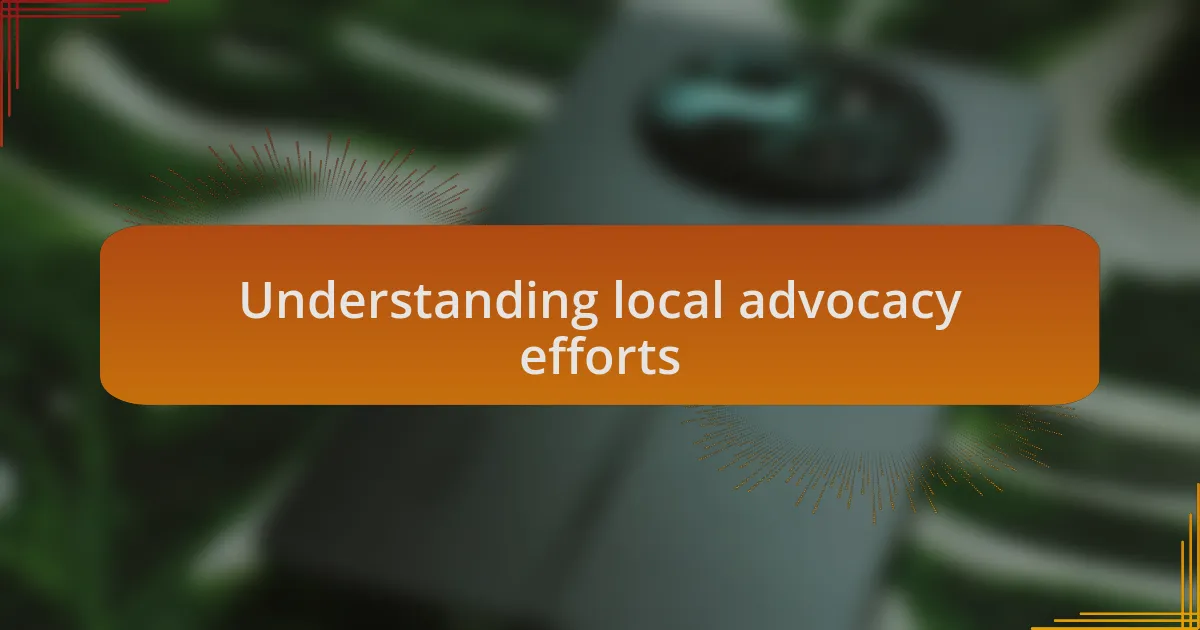
Understanding local advocacy efforts
Understanding local advocacy efforts involves recognizing the unique challenges and opportunities within a community. I remember attending a town hall meeting, feeling the energy in the room as residents shared their experiences with local issues. It struck me how powerful collective voices could be, igniting change when individuals come together with a shared purpose.
Advocacy isn’t just about presenting a case; it’s about storytelling. Consider this: when I shared my own story about struggling with access to local healthcare, I could see the faces of others who related deeply to my experience. Those moments reinforced my belief that emotions play a vital role in advocacy. How often have you felt heard when someone else’s story mirrored your own?
Engaging in local advocacy also means navigating various perspectives within the community. I recall a workshop where we brainstormed solutions to homelessness; passionate discussions led to surprising insights and connections. It showed me that understanding different viewpoints can enrich our advocacy efforts and ultimately lead to more inclusive solutions that benefit everyone. Wouldn’t you agree that empathy is a cornerstone of impactful advocacy?
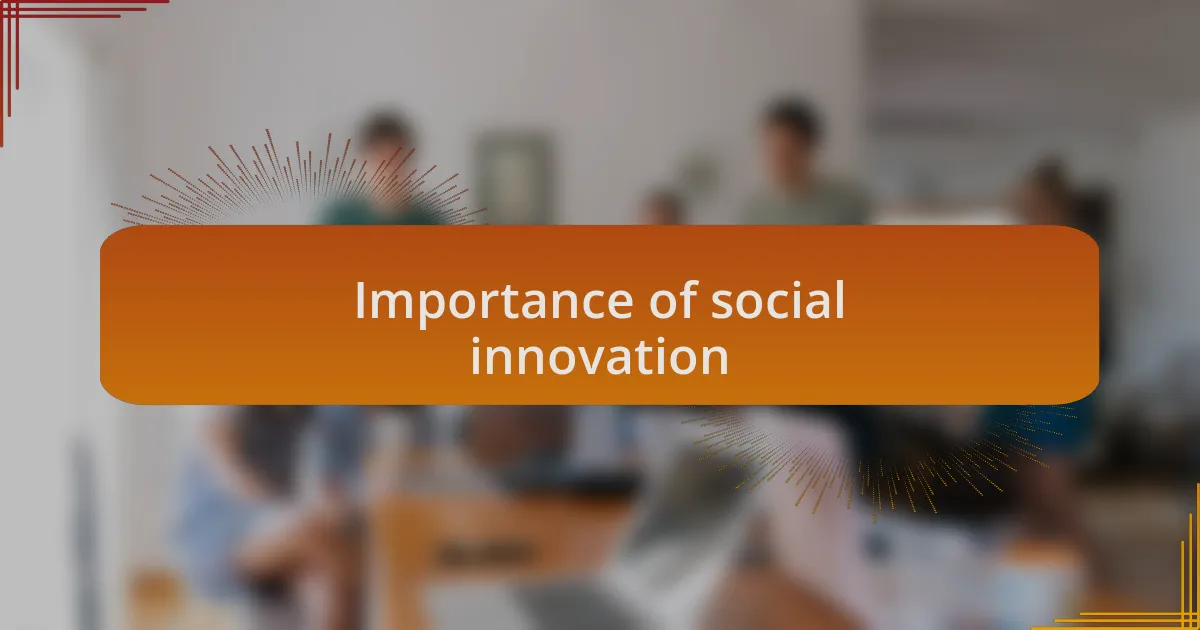
Importance of social innovation
Social innovation plays a crucial role in addressing complex societal challenges. I vividly recall a community project aimed at reducing food insecurity. Watching how local farmers and volunteers transformed unused land into a community garden was inspiring. It highlighted how creative solutions can foster collaboration and uplift entire neighborhoods.
What truly amazes me is the potential for social innovation to create sustainable change. For instance, I’ve seen how developing mentorship programs for at-risk youth not only empowers individuals but also strengthens the whole community. Have you ever considered how one small initiative can ripple outwards, impacting countless lives?
Moreover, social innovation encourages resilience by adapting to changing circumstances. I once participated in a collaborative effort to improve local public transportation; it wasn’t perfect, but the community’s input helped reshape our approach. It made me realize that when we embrace new ideas and continuously learn from each other, we open doors to possibilities we never dreamed could exist. Isn’t that what making a difference is all about?
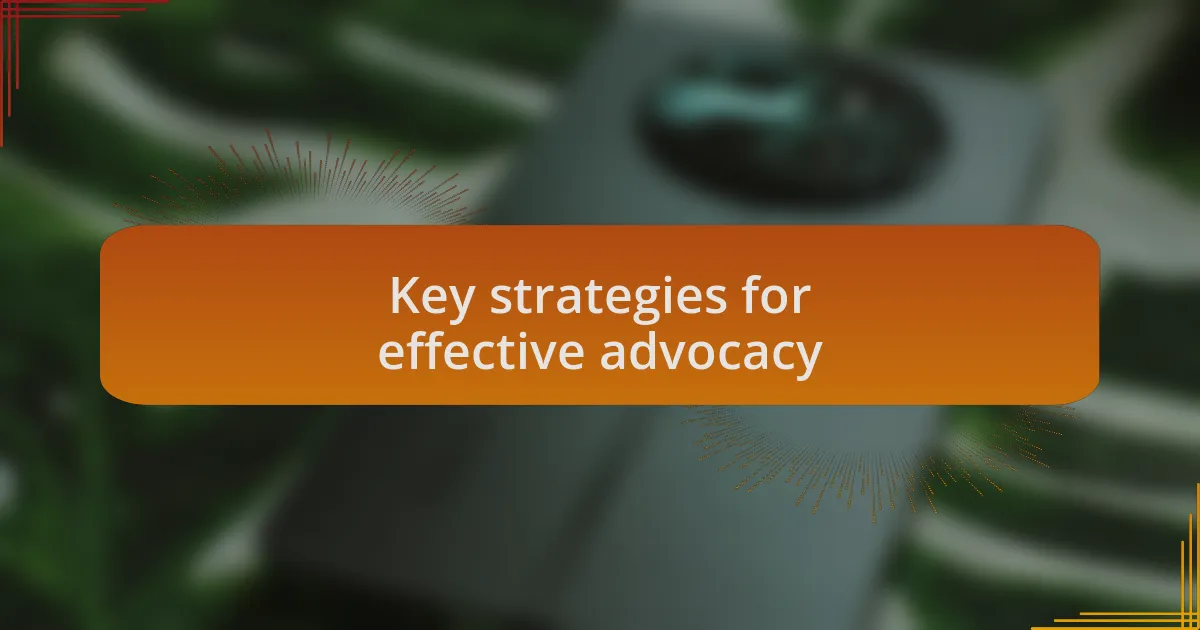
Key strategies for effective advocacy
Advocacy begins with clear communication. I remember joining a grassroots campaign where we had to condense complex issues into simple, relatable messages. It was a tough task, but once we focused on storytelling—sharing personal experiences and real-life implications—the community began to resonate with our cause. Have you ever noticed how a compelling narrative can spark interest and motivate action?
Building coalitions is another crucial strategy for effective advocacy. During my journey, I worked alongside diverse organizations united by a common goal. Each partner brought unique strengths, which transformed our collective voice into a powerful force. Collaborating not only amplified our reach but also fostered a sense of solidarity. Have you ever experienced the magic that happens when different perspectives come together for a shared purpose?
Lastly, leveraging digital tools can dramatically enhance advocacy efforts. I recall launching a social media campaign that connected advocates across various platforms. The engagement was astounding; it not only raised awareness but also mobilized support from individuals who felt connected to our mission, regardless of their geographical location. Isn’t it incredible how technology can bridge gaps and amplify our message in ways we never imagined?
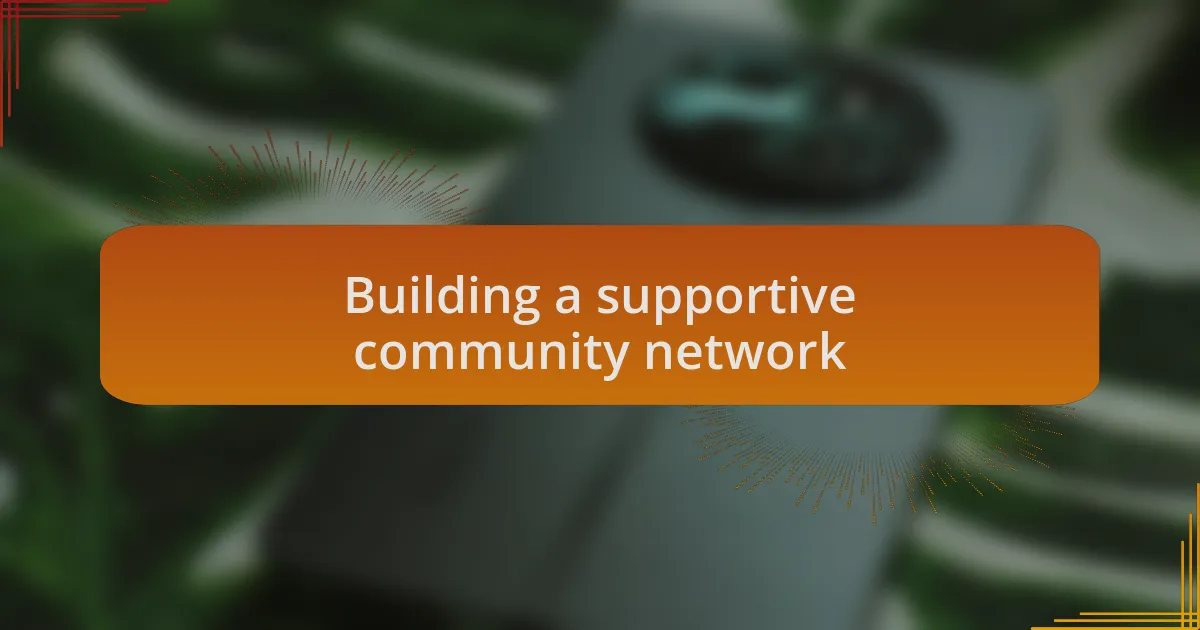
Building a supportive community network
Creating a supportive community network relies heavily on building relationships with individuals and organizations who share your passion. I remember hosting a neighborhood meeting, where I invited local leaders and residents to discuss our shared concerns. As we exchanged ideas over coffee, I felt a collective energy emanating from the group. Have you ever experienced that moment when conversations shift from superficial chatter to meaningful connections? It’s as though a spark ignites, leading to collaborative efforts that can drive real change.
A strong support system can often provide invaluable resources and encouragement. I once partnered with a local nonprofit that specialized in community outreach, and they connected me with experienced advocates who offered guidance. Their mentorship transformed my approach, helping me navigate challenges with confidence. Isn’t it fascinating how the right support can empower us to take bold steps that we might have otherwise shied away from?
Inclusivity is vital in this process. I’ve learned that inviting voices from varying backgrounds not only enriches the conversation but also fosters deeper understanding within the community. For example, I organized a panel discussion featuring speakers from different cultural backgrounds, and the diverse perspectives shared provided critical insights that resonated with attendees. Have you felt the impact of diversity in discussions you’ve participated in? It can create a more robust and empathetic network, making everyone feel valued and heard.
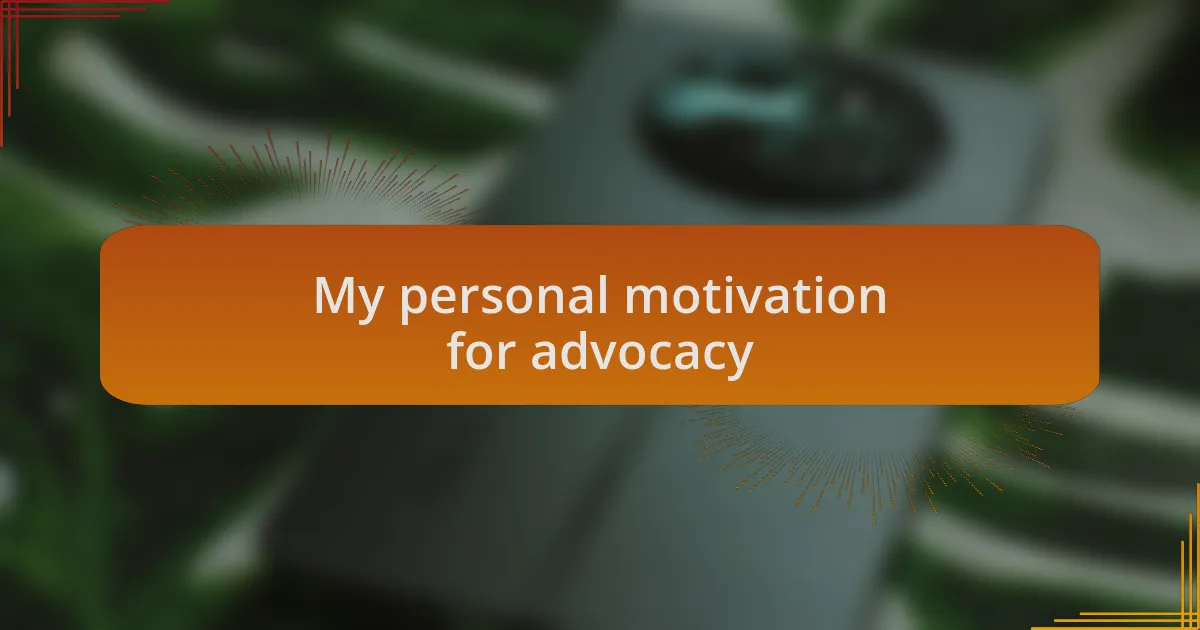
My personal motivation for advocacy
Advocacy has always been a deeply personal journey for me, rooted in my own experiences of witnessing injustice. I remember a poignant moment when a close friend faced discrimination in our community. That experience struck a chord within me, igniting a desire to stand up and speak out. Have you ever felt compelled to act after witnessing something profoundly unfair? It’s this sense of urgency that drives my advocacy efforts.
One of my most significant motivations comes from the stories I’ve heard from individuals impacted by systemic issues. For instance, during a community workshop, a single mother shared her struggle to access affordable housing. Her bravery in sharing left me deeply moved; it highlighted the real-life implications of policies that often feel abstract. I’ve often asked myself: what change can I contribute to alleviate such hardships? This question fuels my commitment to ensuring that every voice is heard and represented.
As I’ve engaged with various communities, I’ve realized that my advocacy is not just about fighting for others but also about personal growth. Every campaign or initiative I’ve undertaken has pushed me to confront my own biases and expand my understanding of different life experiences. Have you considered how advocacy can be a mirror, reflecting both the struggles of others and our own areas for growth? Embracing this duality has created a deeper connection to my work and a greater appreciation for the diverse tapestry of humanity.

Lessons learned from my experiences
I’ve learned that patience is essential in advocacy. There was a project where I passionately fought for improved community services. Initially, I wanted immediate results, but I quickly discovered that meaningful change often requires time and persistence. Have you ever felt the frustration of waiting for progress? I realized that every small step is part of a larger journey that can ultimately lead to impactful outcomes.
Collaboration has been another crucial lesson. In one initiative, I partnered with local organizations to tackle food insecurity. At first, I was hesitant to share the spotlight, but this experience taught me that collective efforts amplify our voices. When we come together with others, we create a community of diverse ideas and resources. Isn’t it fascinating how much stronger we can be as a united front?
Through my experiences, I’ve come to understand the importance of sharing stories. When I arranged storytelling sessions within marginalized communities, I noticed how empowering it was for individuals to articulate their experiences. I questioned why their narratives often remained unheard. This realization reinforced my belief that advocacy is not just about policies; it’s about giving a platform to the people directly affected by those policies. How can we truly advocate without listening to those we seek to help?